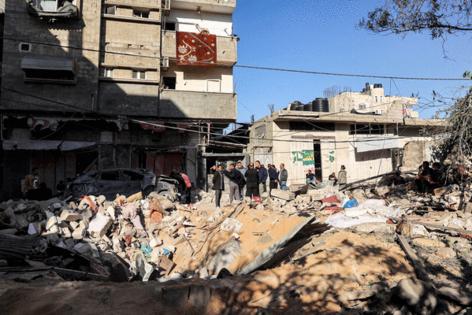US pauses arms shipment to Israel over Rafah invasion plans
Published in News & Features
The U.S. paused a shipment of bombs to Israel over concerns about a potential military offensive on the Gazan city of Rafah, which President Joe Biden opposes, according to a senior administration official.
The delivery was supposed to contain 3,500 bombs, split roughly evenly between 2,000-pound (907-kilogram) and 500-pound explosives, the official, granted anonymity to discuss a sensitive matter, said.
The U.S. is worried about the damage the large bombs could inflict on dense urban areas like Rafah, where around 1.4 million Palestinians are sheltering from Israel’s war with Hamas. Washington has not made a final decision on whether to proceed with the shipment, according to the official.
The prime minister’s office declined to comment and it’s unclear if this delay will have much impact on the military’s operations in Gaza. Still, it speaks to growing tensions between Biden and Israeli Prime Minister Benjamin Netanyahu.
Washington has stepped up its criticism of Israel in recent months, saying it’s not doing enough to protect civilians and allow aid into the besieged Palestinian territory, parts of which the United Nations says are on the verge of famine. At the same time, Biden’s said his support for Israel is ironclad and he’s defended its right to pursue a strategy of destroying Hamas, an Islamist group backed by Iran.
This is not the first time the U.S. has used this kind of tool with Israel, though its far from commonplace.
Former President Barack Obama delayed the delivery of Hellfire missiles for several weeks in 2014 during a previous round of Gaza fighting.
Before that, Ronald Reagan halted a shipment of cluster-type artillery shells after Israel’s invasion of Lebanon in 1982. And Richard Nixon held off providing arms to Israel for the first week of the 1973 Yom Kippur war.
George H W Bush withheld billions in loan guarantees in the early 1990s to protest the building of Jewish settlements in Palestinian territories, but didn’t touch arms sales.
Biden’s decision, reported earlier by the Associated Press, marks one of the most significant moments of discord between Israel and its most important ally since Hamas’s Oct. 7 assault, which started the war. Hamas, designated a terrorist organization by the U.S., killed 1,200 people and abducted roughly 250 when its fighters stormed into southern Israel from Gaza.
...continued
©2024 Bloomberg L.P. Visit bloomberg.com. Distributed by Tribune Content Agency, LLC.







Comments